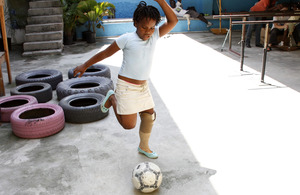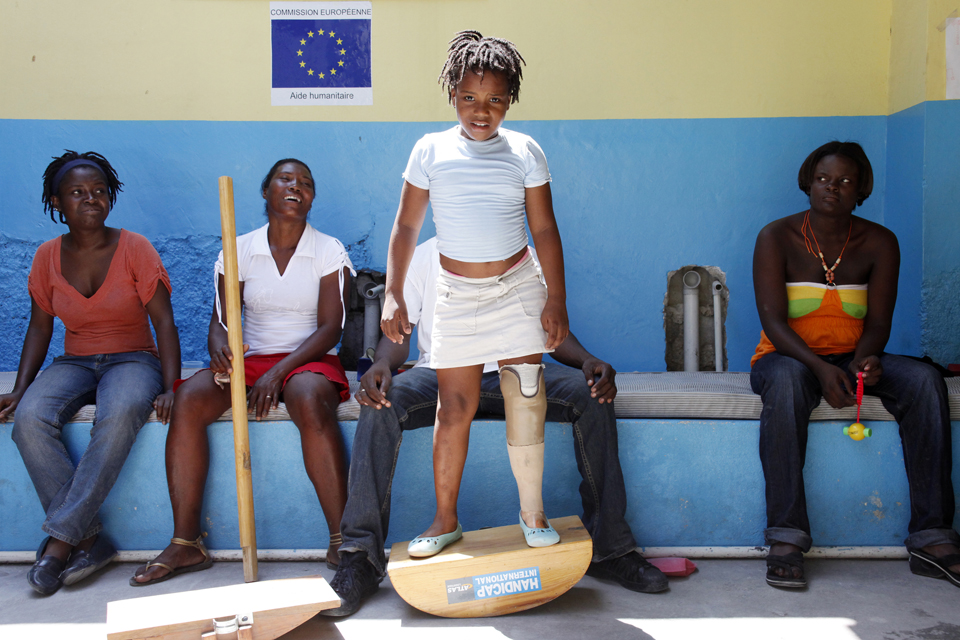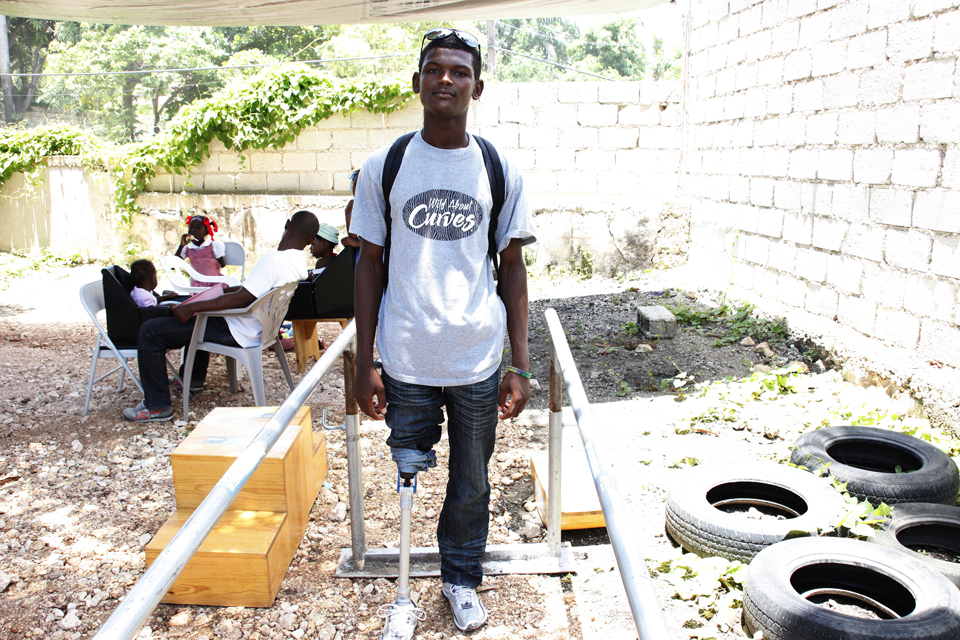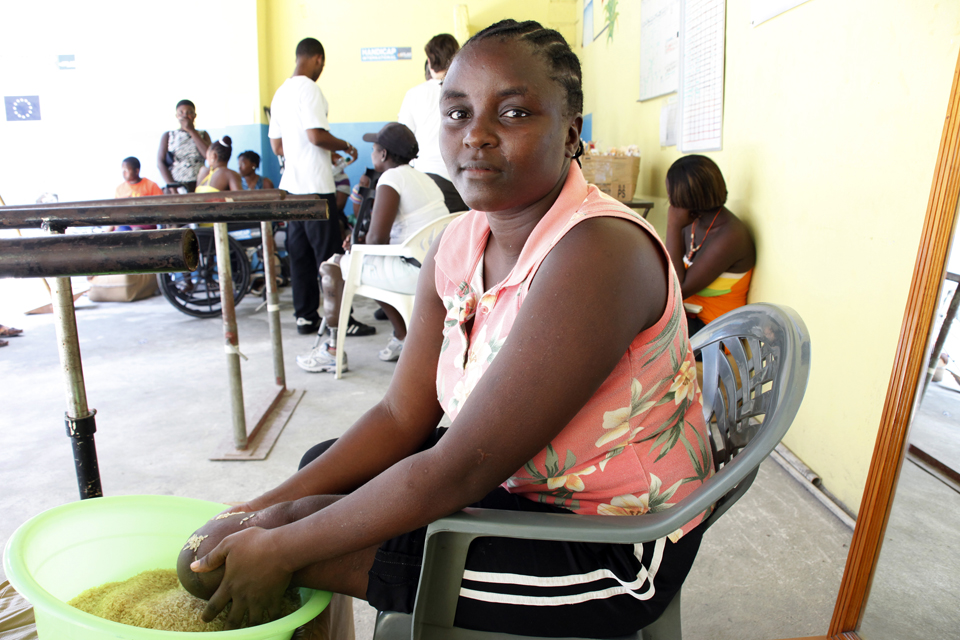Getting people back on their feet in Haiti
How we're helping people in Haiti rebuild their lives 6 months after the devastating earthquake

Renane, aged 8, plays football wearing her new prosthetic leg. Picture: Russell Watkins/DFID
Eight-year-old Renane grins with delight as she kicks a football around in downtown Port au Prince, Haiti. She runs across the courtyard, encouraging another child to join in. Brazil have just beaten Chile in the World Cup and like most other kids in the city, she’s just watched the game.
But Renane has special reason to be happy. The fact that she’s able to play football at all is nothing short of amazing; she’s one of the many people who had to undergo emergency surgery and subsequent amputation in the aftermath of the earthquake which struck Haiti on 12 January 2010.
Renane was at home when the earthquake hit. Her house collapsed and she was trapped for two days. She was lucky enough to be rescued, but her left leg was badly injured and sadly it couldn’t be saved.
After being released from hospital Renane was referred to Handicap International (HI), a charity that was already active in Haiti before the earthquake. HI specialise in supporting people with disabilities around the world and, with a disaster on the scale of Haiti, they knew that many people would need their help.
With the support of UKaid from DFID, Handicap International set up a number of clinics around Port au Prince to assist people like Renane.
HI’s prosthetic and orthopaedic experts quickly assessed her and arranged for a cast to be made of her stump so that they could build a prosthetic leg. A few weeks later Renane was walking unaided again.
Amazingly, she seems completely unfazed by her experience:
“My new leg is great, it’s great to be able to run around again,” she says.
“I want to get back to school now. I love history and would like to be a teacher when I grow up.”

Renane, aged 8, practices balancing whilst wearing her new prosthetic leg. Picture: Russell Watkins/DFID
Getting around and about
About 40 miles from Port au Prince is the small town of Petit-Goave. It was particularly badly hit by the earthquake, so was an obvious choice for the location of one of Handicap International’s ‘antenna’ clinics. Since the clinic was set up in February, it has been seeing around 40-50 patients per day, providing assessments for amputees, physio-therapy and psycho-social support.
Joaquin, aged 22, was trapped in the rubble of his college for two days after the earthquake struck. He had to have his leg amputated, but was then quickly referred on to Handicap’s Petit-Goave clinic who helped to build him a prosthetic leg.

Joaquin, aged 22, walked again just ten days after receiving his prosthetic leg. Picture: Russell Watkins/DFID
Just like Renane, Joaquin was walking unaided again within a few weeks. Brimming with confidence, he is already back at college and full of optimism for the future:
“I’m not quite playing football again yet, but I have been out with friends dancing a couple of times,” he grins.
“I was scared when I was trapped after the earthquake, but I wasn’t scared to go back to college - I couldn’t wait to get back!”
In addition to the clinics, Handicap International also runs a number of mobile teams, which travel around the camps in Port au Prince and Petit-Goave. Many people in Petit-Goave live in remote mountain communities and these teams provide vital information and support for people who can’t get to clinics.
Challenging stigma
Disabled people can often find themselves marginalised in developing countries - especially those that have been beset by natural disaster. So Handicap International’s programme of support includes activities to ensure that patient’s families receive training and advice on how to care for people with impaired mobility, as well as providing advice on livelihoods, shelter and some cash-for-work activity.
Handicap International are also about to start building hundreds of transitional shelters in the Petit-Goave area. Patients will be prioritised to receive these according to their needs. The shelters have been designed to include wheelchair ramp access, extra-wide doors and easy to operate windows, as well as providing resistance to storm-force winds and rain.
However, despite the progress being made, the challenges ahead remain huge, especially for people struggling to come to terms with the loss of a limb.
Sanise, aged 32, has had her prosthetic for nearly a month now, and is finding it hard to get used to. But she is determined to walk again so that she can go back to work.

Sanise, aged 32, massages her stump with dry rice in order to get it used to rubbing movements. Picture: Russell Watkins/DFID
“Wearing it irritates my stump and causes a lot of pain. I have to massage the stump with dry rice to get it used to the sensation of rubbing. But I want to be able to walk again so that I can go back to work and support my children and pay for them to go to school,” she says.
“We lost everything in the earthquake and now we’re living in a tent, but at least we’re alive. The most important thing now is that my kids can go back to school and get an education.”
Key facts and stats
DFID provided £500,000 of humanitarian funding for Handicap International’s emergency response, representing one sixth of their total budget.
Handicap International have assessed or treated over 5,000 injured people in Port au Prince and communities around the Petit-Goave area.
UK aid funding also supported an emergency field hospital for the NGO Merlin (Medical Relief International), which carried out over 350 life-saving operations.
The UK government committed a total of £20m in emergency humanitarian support for Haiti, enabling vital work by a range of UN agencies and International NGOs.